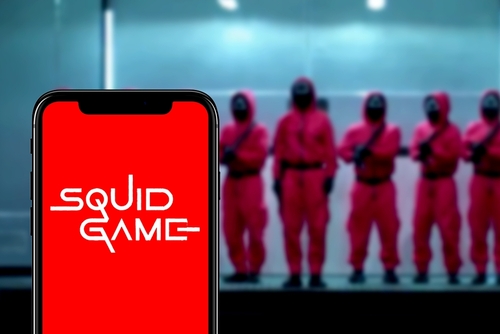I was so proud of myself at the beginning of the pandemic for not giving into the hype and watching Netflix’s Tiger King. In the face of countless memes, tweets, and discussions, I remained undaunted in the face of the social pressure to engage the show.
When Netflix released Squid Game in September of this year, I also intended on passing. However, I was ultimately overcome by an appreciation for—and curiosity about—South Korean film and television. Also, there were lit memes.
The premise of Squid Game, as described by Wikipedia, is as follows:
Seong Gi-hun, a divorced and indebted chauffeur, is invited to play a series of children’s games for a chance at a large cash prize. Accepting the offer, he is taken to an unknown location where he finds himself among 456 players who are all deeply in debt. The players are made to wear green tracksuits and are kept under watch at all times by masked guards in pink jumpsuits, with the games overseen by the Front Man, who wears a black mask and black uniform. The players soon discover that losing a game results in their death, with each death adding ₩100 million to the potential ₩45.6 billion grand prize. Gi-hun allies with other players, including his childhood friend Cho Sang-woo, to try to survive the physical and psychological twists of the games.
In facilitating the games, said “masked guards in pink jumpsuits” engage in a fair amount of violence, up to and including murdering losing contestants. It’s pretty clear they are doing so at the direction of the Front Man and their other bosses at Squid Game, Inc. But what if the folks facilitating the games were discovered and sued for the guards’ activities? Could they simply say, “We didn’t do anything—it was the guards”?
Unfortunately for the individuals in charge of the games and who employ the guards, the doctrine of respondeat superior—a type of vicarious liability—would likely prevent them from claiming they should not be held liable for actions of their minions. According to Cornell Law School’s Legal Information Institute, respondeat superior is “[a] legal doctrine, most commonly used in tort, that holds an employer or principal legally responsible for the wrongful act of an employee or agent, if such acts occur within the scope of the employment or agency.”
In Mary M. v. City of Los Angeles, in an opinion issued in 1991, the California Supreme Court stated that respondeat superior “is based on a deeply rooted sentiment that it would be unjust for an enterprise to disclaim responsibility for injuries occurring in the course of its characteristic activities.” In articulating the policy rationale underlying the doctrine, the Court noted the following: “(1) to prevent the recurrence of tortious conduct; (2) to give greater assurance of compensation for the victim; and (3) to ensure that the victim’s losses will be equitably borne by those who benefit from the enterprise that gave rise to the injury.”
The contours of vicarious liability under the respondeat superior doctrine may vary by jurisdiction. California courts, for example, have taken a broad view of the types of actions considered to be within the “scope of employment.” Under California law:
- The fact that an employee is not engaged in the ultimate object of his or her employment at the time of his or her wrongful act does not preclude attribution of liability to an employer.
- Where the employee is combining his or her own business with that of his or her employer, or attending to both at substantially the same time, no inquiry will be made as to which business the employee was actually engaged in at the time of the injury, unless it clearly appears that neither directly nor indirectly, he or she could have been serving the employer.
- An employer’s vicarious liability may extend to willful and malicious torts of an employee, as well as negligence.
- An employee’s tortious act may be within the scope of employment, even if it contravenes an express company rule and confers no benefit to the employer.
However, vicarious liability under respondeat superior has its limits, even in my beloved, employee-friendly home state of California. As discussed by the California Supreme Court in its 1995 opinion in Farmers Insurance Group v. County of Santa Clara, “if an employee’s tort is personal in nature, mere presence at the place of employment and attendance to occupational duties prior to or subsequent to the offense will not give rise to an action against the employer” because, “[i]n such cases, the losses do not foreseeably result from the conduct of the employer’s enterprise and so are not fairly attributable to the employer as a cost of doing business.”
If one were to apply respondeat superior to circumstances presented in Squid Game, there is no doubt that (1) holding the Front Man and others running the games responsible for the actions of their guards would be consistent with the public policy considerations underlying the doctrine and (2) the guards are acting within the scope of their employment.



